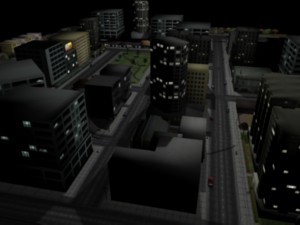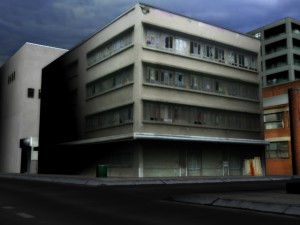Digital games are nearly thirty years old and played by an ever widening demographic. They permeate our culture, with annual sales figures approaching that of the film industry – yet most only address a narrow range of topics. The significant majority of digital games focus on relatively simplistic, often aggression-based entertainment, as if nine out of ten cinemas only showed action films featuring Arnold Schwarzenegger.

Street Survivor's gothic cityscape incorporates Melbourne's landmarks
There are the occasional tall poppies rising above this generalisation – games with unique style like Ico, The Sims, Riven, Katamari Damacy. But at the end of the day, most games are based around driving, combat, sport, or jumping around like a cane toad on a hotplate.
But things change. The tentative green seedlings of emergent sub-genres are starting to show in the cracks. Games as art. As politics. As educational media. Games as culture.
Eventually all popular media reflects and comments on politics. So it’s no surprise that as creators and audience increasingly perceive games as art, they too become politicized. As cinema before them, games are starting to offer “documentary experiences”, but can an interactive medium really present a factual interpretation of a political, historical, or social issue?
The makers of 9-11 Survivor, Escape From Woomera and Waco Resurrection think so. One of the highest profile documentary games is Australia’s Woomera, and now a Melbourne-based game documenting the homeless experience is in production. Street Survivor attempts to simulate the homeless experience, forcing the player to survive challenges both mundane and exceptional.
Kirsty Baird, Street Survivor’s originator, is the first to admit inherent problems with applying the documentary label to an interactive experience, “Originally documentary is exactly what I thought it was. I was really excited by the idea of a documentary game. Even though I knew very little about gaming it seemed like a novel and interesting concept. But what I want now, is not ‘reality’ as such, I want to enable people to practice in this interpretation of reality and learn from it.”
All documentary media is filtered through authorial bias, the very desire to educate people implies belief in one’s perspective. In games the player is immediately politicized, forced to interact within constraints built by the creator’s notion of valid actions. In passive media the audience simply views, but games force the audience to participate, make choices, become directly involved in the creator’s opinions and therefore become politically implicated. The Grand Theft Auto series allows players to commit all manner of social harm but no social good. One cannot steal money from a gangsta and give it to the needy. This was a simple playability decision, but it constrains the player within specific behaviors.
So why make a game instead of a traditional media documentary? “The interactivity of games, the nature of game worlds and play enable a directness of experience and agency that film can’t possibly offer”, says Kirsty. “It seemed completely logical for a game to be used so as to communicate on a number of levels, rather than just as entertainment.”
Given that many expect only amusement from games (some theorists insist that if a game isn’t “fun” it’s somehow not a valid experience), the decision to use a medium known for light-hearted, apolitical entertainment to communicate serious issues is unusual. However Kirsty believes this is the key to Survivor’s potential success, “We always knew that we didn’t want to be didactic. We didn’t want people to be forced to learn. We want them to play it because it’s fun and to learn in spite of themselves.”

A familiar rundown building on Spencer Street houses squatters in Street Survivor
Street Survivor emphasises player learning and education, and this could take it beyond the scope of a simple documentary on the plight of homeless people. “It took me a long time to realize, but I am really trying to making an educational game. It is documentary, it’s political, but it’s about information and promoting ‘help seeking behavior’.” Kirsty reveals.
So for this game, the primary audience is mainly those it documents, the homeless rather than those who are simply interested in the issue. “Yes, ideally you play the game, then when you return to the streets you know about real-world equivalents of the game’s locations. Places to get free food or clean needles. For a secondary audience of school goers it could serve an informative, advocacy role. It is recognisably Melbourne, and is loosely based on real stories but it is important that the distinction is made between the content of this or any game, and the real world.”
As an educational game, rather than a deliberately political, documentary piece intended to inform about issues of homelessness, there is an obvious pitfall here; the future of game distribution is full of possibilities for expanding the potential for documentary, political, and art games. “Free” download, mobile phone access, computer/TV convergence, but given that few of the homeless have access to game hardware, how will they access this educational advocacy experience? The Street Survivor team will test a working prototype via the knot@home sites in welfare and community centres, with the final game sold or distributed to welfare agencies and schools. “It’s part of a raft of material being pitched to teachers as learning tools, targeted at the educational market,” says Kirsty.
Once an educational game reaches its audience, what can it be expected to actually teach? Much is made about negative behaviour learnt from games – violence committed by those obsessed with particular games, ethically shaky games weakening real world morals – but can games teach positive behaviour? Kirsty hopes so, “Street Survivor is about homelessness, drug addiction, crime and destructive cycles that are difficult to break. Really, everyone is to some extent vulnerable to these cycles and the game shows how to survive despite these kinds of behaviours as well as trying to overcome them. It’s also about the kinds of things you can do to help yourself and be helped.”
Unsurprisingly both Street Survivor and Escape from Woomera are arts body funded and fall outside the traditional distribution model. Is there any chance that documentary gaming will ever be profitable enough to move into the commercial arena? If profit raises its head, it will bring with it the possibility for compromise. The recent controversy over America’s Army, a US military-funded game that purports to show the reality of war is a spectacularly ironic example of where this can lead.
But even as a non-commercial niche medium, documentary games have a lot to offer. The subjectivity that makes games easily politicised is also a strength. Film can only show how others live, offering vicarious experiences through proxy. Documentary games could offer understanding of different cultures or lifestyles from an inside, first hand experience. There is vast potential to be explored, and with the current growth in cultural game content, we may see more games from this direction. After all, as enjoyable as they might be, you can only watch so many action films before you need something more substantial with your popcorn.
Tech
Street Survivor is being developed in a custom game engine built with Macromedia Director 3D Shockwave (SW3D). The SW3D engine can import models from 3DS Max, and its web browser plugin is available on Linux, Windows and OSX, offering surprisingly high quality, browser-based, 3D performance.
Escape From Woomera
You thought escaping from Castle Wolfenstein was hard…this adventure-centred Half-Life mod was designed by a group of anonymous “industry veterans” to highlight the plight of asylum-seekers. Funded by the Australia Council, it drew the ire of the federal Liberal government and was a minor cause célèbre in Europe.
9-11 Survivor
Coming soon, Holocaust Sims… this Unreal mod by students at the University of California-San Diego puts the player in the Twin Towers on September 11. Questions of taste aside it’s arguably (of the current crop of doco games) the concept best suited to traditional gameplay models; running, jumping, exploration etc.
Waco Resurrection
Described by its makers as a “subjective documentary” this is the equivalent of cinema’s “inspired by real events.” It starts with the facts then veers wildly into unusual territory. Not only can the player’s David Koresh avatar run, jump and shoot, but he also gains special abilities from Bible pickups. Understandably Branch Davidian survivors are taken aback, one has been quoted as saying “It’s not a game. What happened there was real and real people died.”
Jim Batt
Jim Batt is a freelance designer with Game Mechanic consultants.
Read More
http://www.selectparks.net/archive/escapefromwoomera/
http://www.selectparks.net/911survivor/
 This work is licensed under a Creative Commons Attribution-NonCommercial-ShareAlike 2.5 Australia.
This work is licensed under a Creative Commons Attribution-NonCommercial-ShareAlike 2.5 Australia.






